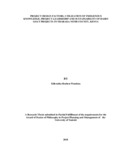| dc.description.abstract | Road transport infrastructural projects are considered successful when delivered within the traditional iron triangle constraints. Nevertheless, the aspect of delay in the completion of roads infrastructure projects has become a critical construction challenge with a global dimension, often leading to time and cost overruns. This has attracted extensive research work to be done on the global phenomenon of construction delays, with research gaps being identified in the various project-based factors that influence completion of road infrastructure projects. The research study therefore sought to investigate Project Factors Influencing Completion of Rural Roads Project in Kenya: A case of Rumuruti - Maralal Road Project in Laikipia and Samburu Counties. The study’s objectives were: To determine the influence of Stakeholders’ Participation, Project Financing, Contract Management and Project Specifications on Completion of Rural Roads Projects in Kenya. The study was grounded on the Stakeholders’ Theory. The study used descriptive survey research design and interviews. The study’s target population was the staff of KeNHA, Rumuruti-Maralal Road Project’s Contractor, and Consultant making a total of 100 respondents. Due to the study having a case of small number of the target population, the study adopted a census survey and therefore a complete enumeration of the entire 100 respondents was done. This study adopted purposive sampling and stratified random sampling. A semi structured questionnaire and an interview guide were adopted as the research instruments. The quantitative data from the questionnaires was coded by Statistical Packages for Social Scientists tool. Descriptive statistics was analyzed by the use of arithmetic means and standard deviation. Data was presented in frequencies and percentages tables. Qualitative data obtained from the interviews was transcribed content according to themes and constructs aligned to the research objectives, identifying similarities and differences that emerged during the interviews. Secondary data aligned to the research objectives was obtained from published books, scientific dissertations, peer-reviewed journals and other related scholarly publications was augmented with the primary data. Inferential statistics was analyzed by Pearson’s Correlation. From the study findings on completion of rural roads projects in Kenya, the composite mean and standard deviation was found to be 3.645 and 3.321 respectively. On the theme of stakeholders’ participation, the composite mean and standard deviation was found to be 3.550 and 3.229 respectively. On the theme of project financing, the composite mean and standard deviation was found to be 3.516 and 3.195 respectively. On the theme of contract management, the composite mean and standard deviation was found to be 3.280 and 2.939 respectively. On the theme of project specifications, the composite mean and standard deviation was found to be 3.418 and 3.069 respectively. From the findings the study concluded that stakeholders’ participation, project financing, contract management and project specifications influence completion of rural roads projects in Kenya. The study recommended that government should ensure that stakeholders’ participation in projects is comprehensive since they substantially influence or are influenced by a decision of another affecting the project activities; adequate funds should be provided to support the execution of a project in order to be successful; the use of creative contracting approached, established as a good practice leading to effective construction process and complete projects and finally, successful management of the crucial and complex interface between design and pre-construction activities should be observed since it is important in the realization of projects completed within quality, cost and timelines. Areas for further research has been given. | en_US |




